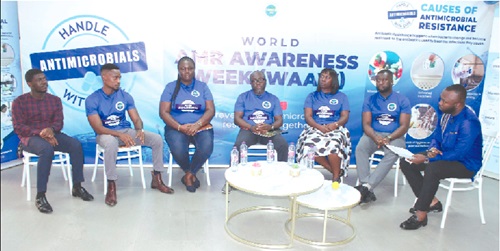
Vaccination key to fighting AMR — Health professionals
Panellists at a dialogue to discuss Antimicrobial Resistance (AMR) have said that the surest way to fight it was to focus on preventive measures such as vaccination and practising good hygiene in the communities and hospitals.
Advertisement
They said disease-causing organisms usually cannot resist vaccines.
The panellists made this known when the FOCOS Orthopaedic Hospital marked the World AMR Awareness Week in Accra on November 24.
It was on the theme “Preventing antimicrobial resistance together”.
The panellists were the Head of Medical Services at FOCOS Orthopaedic Hospital, Dr Francis Addai; the Head of National Public Health and Reference Laboratory at the Ghana Health Service (GHS), Dr Gifty Boateng, and the Head of Pharmacy at FOCOS Orthopaedic Hospital, Benjamin Ampadu.
The rest were a health representative, Michael Akaadom; a Public Health Nurse Specialist at FOCOS, Bismark Adams, and a Nurse Manager in charge of Inspection and Prevention at FOCOS, Claudia Wireko-Tei.
They said AMR, which was on the rise and is now a public threat, occurs when bacteria change and become resistant to the antibiotics used to treat the infections they cause.
AMR, they said, can be caused by the misuse and overuse of antibiotics, poor infection control in hospitals and clinics, unfinished treatment, overuse of antibiotics in animal farming, lack of hygiene and poor sanitation and the lack of new antibiotics being developed.
Vaccines
Mr Adams said “Vaccines can block the pathways or transmissions of viruses and pathogens and stimulate the bodies to produce antibodies which can recognise the organisms in the body and then make them inactive,” he said.
Mrs Wireko-Tei, meanwhile, said it was crucial to prevent infections by practising personal hygiene and making a conscious effort to change behaviours such as segregating waste in hospitals.
Dr Addai similarly said AMR was a threat to gains made in surgeries.
He urged the public to adhere to the prescription, its duration and frequency.
Laboratories
Dr Boateng called for laboratories to be strengthened to allow the release of results in good time for effective monitoring and evaluation.
She stated that a five-year AMR policy which was developed in 2017 to fight AMR prevalence had ended, but added that the Ministry of Health would, next year, develop a new policy with an action plan to fight the AMR.
Mr Ampadu urged the public to desist from self-medication and seek professional help whenever they are ill.
Mr Akaado also said the pharmaceutical industry was doing research and development to come up with newer agents and vaccines.
He said they were also collaborating with institutions and agencies to ensure that medications received by patients were not substandard but of excellent quality.
Infections
The Chief Executive Officer (CEO) of FOCOS Hospital, Dr Irene Adorkor Wulff, said AMR makes treating infections harder.
She said resistance has been reported in TB infections, malaria, HIV, and influenza, and more alarming is the increasing resistance to last-resort medications.
She said following the call by the World Health Organisation (WHO) to get involved in AMR stewardship, the hospital was using lifesaving medications the right way.




